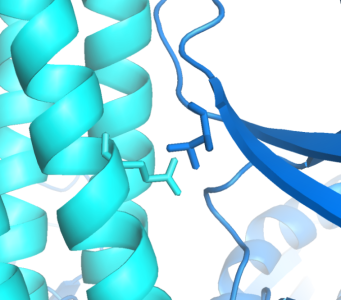University of California San Francisco 2006
From 2006.igem.org
(Difference between revisions)
| Line 17: | Line 17: | ||
[[Image:complex1.jpg|thumb|right|300px|''Our success and livelihood as a team hinges on these two residues'']] | [[Image:complex1.jpg|thumb|right|300px|''Our success and livelihood as a team hinges on these two residues'']] | ||
*'''Implementation of the genetic switch:''' This will allow us to toggle between the selective expression of either Chew. | *'''Implementation of the genetic switch:''' This will allow us to toggle between the selective expression of either Chew. | ||
| - | *'''Validation of chemotactic properties through specially developed assay:''' originally developed by the good folks at the [http://www. | + | *'''Validation of chemotactic properties through specially developed assay:''' originally developed by the good folks at the [http://www.physics.upenn.edu/facultyinfo/goulian.html Goulian Lab] in 2006. |
Revision as of 00:22, 27 September 2006
Contents |
The University of California at San Francisco 2006 iGEM Team
The international Genetically Engineered Machine Competition is an opportunity for emerging young scientists of all disciplines to tinker with the proverbial Rube Goldberg machine of life. This is the UCSF team's third year in the program, and to celebrate our three years, we had a members-only contest to develop a team logo. More information on the logo is forthcoming.
Team Members
- Ala Trusina
- Patrick Visperas
- Kevin Shay
- Matt Eames
Faculty Advisors
- [http://www.voigtlab.ucsf.edu/ Chris Voigt]
- [http://kortemmelab.ucsf.edu/ Tanja Kortemme]
Aspirations, Dreams...
The UCSF iGEM team, aka Team Death Wish V, has endeavored to control chemotaxis by selectively expressing CheW mutants which will participate in an orthogonal interaction with the methyl-accepting chemotaxis protein Tar. The project will be broken down into three major components:
- Design and construction of the orthogonal interaction: An existing orthogonal interaction, to be used as a starting point prior to computational redesign, was discovered by [http://www.ncbi.nlm.nih.gov/entrez/query.fcgi?db=pubmed&cmd=Retrieve&dopt=AbstractPlus&list_uids=1860813&query_hl=2&itool=pubmed_docsum Liu and Parkinson] in 1991.
- Implementation of the genetic switch: This will allow us to toggle between the selective expression of either Chew.
- Validation of chemotactic properties through specially developed assay: originally developed by the good folks at the [http://www.physics.upenn.edu/facultyinfo/goulian.html Goulian Lab] in 2006.



